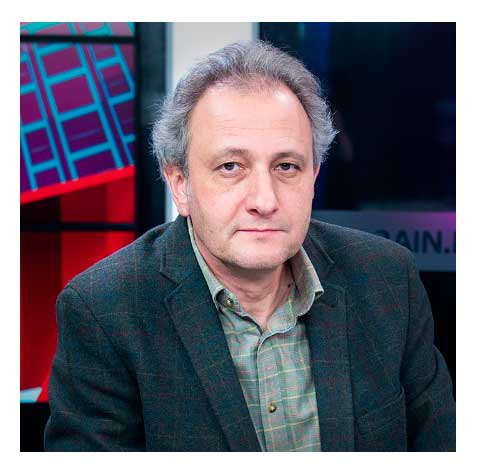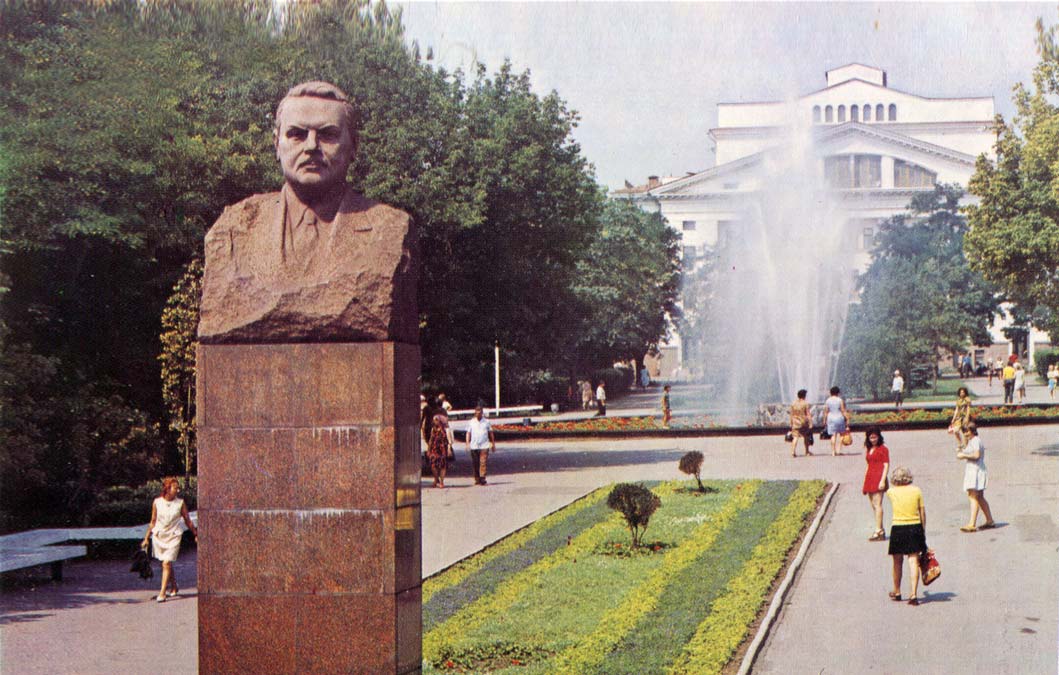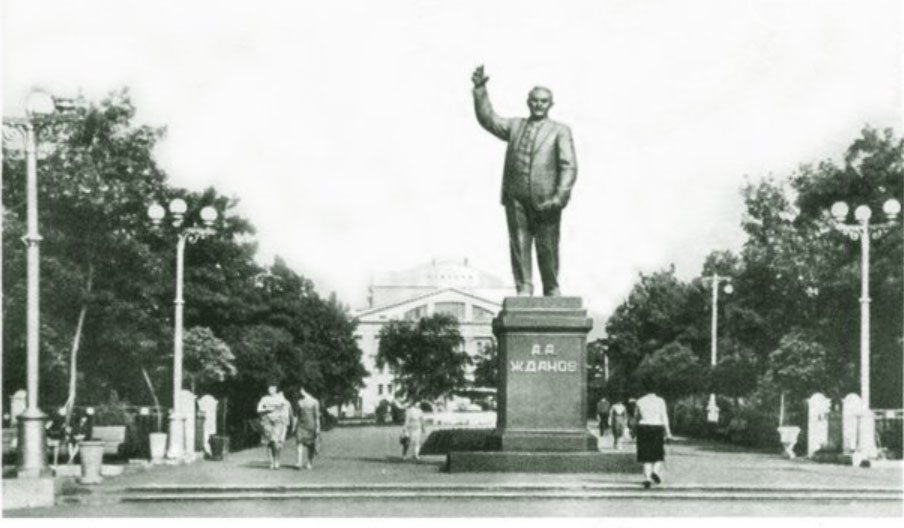 An expanding empire needs to mark its territory, to fill in the outline map. This can be done in various ways. Back in 2024, Deputy Prime Minister for Construction Marat Khusnullin admired, reporting to Putin, the night Mariupol, which looks just like a "European city." However, there is a suspicion that even before 2022 it looked no worse. Now an ideological step followed: in the city, formerly Zhdanov, a museum of Andrey Zhdanov has opened. The territorial acquisition is emphasized in the most impressive way — it now bears the "stamp," the image of one of the most brutal Stalinist henchmen. The journey through time is intended to show how the authorities themselves see the future — as a future in the past. The descent into archaism is clearly confirmed symbolically.
An expanding empire needs to mark its territory, to fill in the outline map. This can be done in various ways. Back in 2024, Deputy Prime Minister for Construction Marat Khusnullin admired, reporting to Putin, the night Mariupol, which looks just like a "European city." However, there is a suspicion that even before 2022 it looked no worse. Now an ideological step followed: in the city, formerly Zhdanov, a museum of Andrey Zhdanov has opened. The territorial acquisition is emphasized in the most impressive way — it now bears the "stamp," the image of one of the most brutal Stalinist henchmen. The journey through time is intended to show how the authorities themselves see the future — as a future in the past. The descent into archaism is clearly confirmed symbolically.
The piquancy — and additional cynicism — of the situation is that the museum in Mariupol is a branch of the Museum of the Defense and Siege of Leningrad. The re-museumification of Zhdanov was announced by the Vice-Governor of St. Petersburg Boris Piotrovsky, in turn the son of the director of the Hermitage Mikhail Piotrovsky, the author of the definition that Russians are "militarists and imperialists" (in his view, in a good sense). That is, the "casting in granite" of the Stalinist executioner is a conscious, deliberate, and well-tempered action implemented within the framework of cultural policy, so close to the party leader restored to his rights.
The role, place, and deeds of Zhdanov during the blockade are too well known — these are shameful pages of Soviet power. If you like — dark ones. But talking about them being black will now, after museumification, be considered slandering history. Again, as it was four decades ago.

Bust of A.A. Zhdanov. Mariupol, 1978. In the background — Mariupol Drama Theater. Photo: Yuriy Zhilovets
Yuri Fedorovich Karyakin wrote about this in 1988 in his famous passionate article "Zhdanov Liquid, or Against Slander" in the magazine "Ogonyok," later reproduced in the collection "There is No Other Way." Addressing the Stalinists, he asked: "Why — at best — are you ready to recognize the black pages of our history as a 'state secret,' to which, they say, our people have not matured? (They have matured to the point of being repressed, but not to the truth about this repression?)".
Zhdanov has as much to do with the blockade as the SVO does with the Great Patriotic War. His attachment to the Leningrad tragedy is a defamation of human resilience.
Contrary to already publicly available historical knowledge, contrary to history itself, Zhdanov is being raised on a shield. And not just anywhere, but in Mariupol, a city whose fate, no matter which side of the trench you look at it from, is tragic. And it is still necessary to emphasize this tragedy with the re-mythologization of the figure of the Stalinist "hangman." Why such cynicism? Why such cruelty? Violence against history, desecration of the memory of both the blockade survivors and the repressed, to whose suffering and death Andrey Alexandrovich, the Leningrad leader, curator of Agitprop, and even a temporary but unsuccessful governor of post-war Finland, had a direct relation.
Even his death, like Stalin's, took many lives with it: Lydia Timashuk's denunciation of the "killer doctors," allegedly responsible for Zhdanov's death, caused the most severe suffering to innocent, most worthy people.
And now — such a crude straightforward symbolism. It reminds of something else from Yuri Karyakin's article: "In Yelabuga, there is a house preserved where Marina Tsvetaeva spent the last days of her life, where she died. On the house — a memorial plaque, and there will probably be a museum. Address — Zhdanov Street". The same symbolism as with the Zhdanov museum in Mariupol.
"Received a letter from the city of Zhdanov: people are being poisoned for wanting to live in Mariupol again", — continued Yuri Fedorovich. And he suggested that the Stalinists indulge in their Stalinism: "Let them build Zhdanovgrad for themselves". And now, having regained absolute power in historically short terms, they have built it.
The preservation of Zhdanov's name, Karyakin insisted, is "a defamation of the future." The return of Zhdanov's name today can be characterized by the same words — yes, it is a defamation of the future. Which we do not have yet, but it may still come. Will we really have to go for a second round to get rid of the corpse poison of Stalinism, from its powerful relic radiation emanating from the Kremlin wall? Both Zhdanov and Stalin remain in the Kremlin necropolis, with busts.

Monument to A. A. Zhdanov (the first) near the city square. Mariupol, 1962. Photo by L. Gorny
Zhdanov liquid, Karyakin reminded, is a substance that masked the smell of corpses. Indeed, symbolism, completely forgotten. Forgotten to such an extent that the triumphant return from the hell of the pantheon of key Stalinist figures became possible. How literally applicable to today and how semantically significant is Yuri Fedorovich's metaphor — Zhdanov liquid!
Andrey Alexandrovich was considered a cultured person, played pianos, educated figures of art with statements and decrees. A real character from Lev Kopelev's documentary story about the Marfino sharashka "Soothe My Sorrows," a lady in uniform and rank, for whom a prisoner wrote a dissertation, reasoned about music, in particular, about Shostakovich: "But his music is completely un-Russian. Cosmopolitan. Everyone knows this. Comrade Zhdanov said so, and there were party decisions..." Comrade Zhdanov was a walking verdict, breaking lives. People of this type unmistakably determined and still determine, like now, everything talented, to destroy it because it is "detached from life."
They were detached from life, including Anna Akhmatova. Former director of the Akhmatova Museum in St. Petersburg Nina Popova says: "It is impossible to agree with the return of his name — it is a violation of the moral norm of society's life."
Exact definition — it is the destruction of human norms. Zhdanov is a "traditional value," not a human one.
Zhdanov's decree on the journals "Zvezda" and "Leningrad" was not dared to be canceled for 42 years, until 1988 — to such an extent it accurately expressed the essence of Stalin's cultural policy. In tone, style, content, destructive and disciplining others. Karyakin: "How many times in his long speeches did Zhdanov stigmatize writers, artists, philosophers, musicians for 'detachment from life'... most of all from culture itself he wanted culture to glorify the murder of culture itself."
There was such a concept, Yuri Fedorovich reminded, "Kirov flow": it was he, Zhdanov, "directly ordered, compiled, and signed those lists (the main part of his 'Literary Heritage' — enough for more than one volume), according to which many tens of thousands of Leningraders 'flowed' into prison, camps, exile, torture, death."
Putinism is plagiarism from Stalinism. Nothing of its own, even the interpretation of history — from there. From where, it seemed, no one should have returned. But they return because the aspen stake was not driven into the body of Stalinism.
Sixty-four years ago, not just anywhere, but in the newspaper "Pravda," Yevgeny Yevtushenko's poem "Stalin's Heirs" was published. It very accurately said:
Where does the wire from that grave still stretch?
No, Stalin did not die. He considers death reversible.
We took him out of the mausoleum.
But how to remove Stalin from Stalin's heirs?
They did not remove him. Rather, they brought him back in. Yagoda's portrait hung on the wall in the police department behind Alexei Navalny. Beria rose in the "Rosatom" pavilion at VDNKh. Zhdanov is now quite officially rehabilitated. Unified textbooks explain everything clearly or remain silent about some fundamental moments of the harsh history.
Karyakin wrote in "Zhdanov Liquid": "And the disclosure of monstrous crimes is slander... For you, the crime is the very disclosure of crimes." Now there are special articles in the Criminal Code for "slander." Political articles. Conscious lie, mythological lie elevated to the absolute and has become state policy. An attempt on the lie is punishable. "And most importantly: Stalin is a continuous, systematic lowering of the price of human life... personality is the main enemy."
A person is expendable material of mythologized history, an instrument in the hands of a dictator. Such a Zhdanov piano. If a person is a personality, it is difficult to make "heroic" cannon fodder out of them. And to intoxicate with yet another museum exposition. Therefore, a thinking individual becomes an enemy of the regime.
As Boris Piotrovsky reported, "the museum of Andrey Zhdanov will become a new cultural and educational center — we will develop it together, hold many events for both adults and the younger generation."
"People who shot at our fathers are planning for our children" — all according to Boris Borisovich Grebenshchikov. The lines of this song were written by him almost at the same time as Karyakin's "Zhdanov Liquid." Then it seemed that the Stalinists had no chance, that "there is no other way." That they would not reach the children and grandchildren. They did.
So far, we have lost the main war — the war of memory. And Zhdanov liquid, as before, masks the corpse smell, which the average layman tries with all his might not to notice. Or more than that — justifies it with higher interests. The future is poisoned and defamed.
"Slander is a lie. — wrote Karyakin, — Truth cannot be slander. Truth can only be purification." The only remaining weapon of resistance.
* Andrey Kolesnikov is considered a "foreign agent" by the Russian Ministry of Justice.